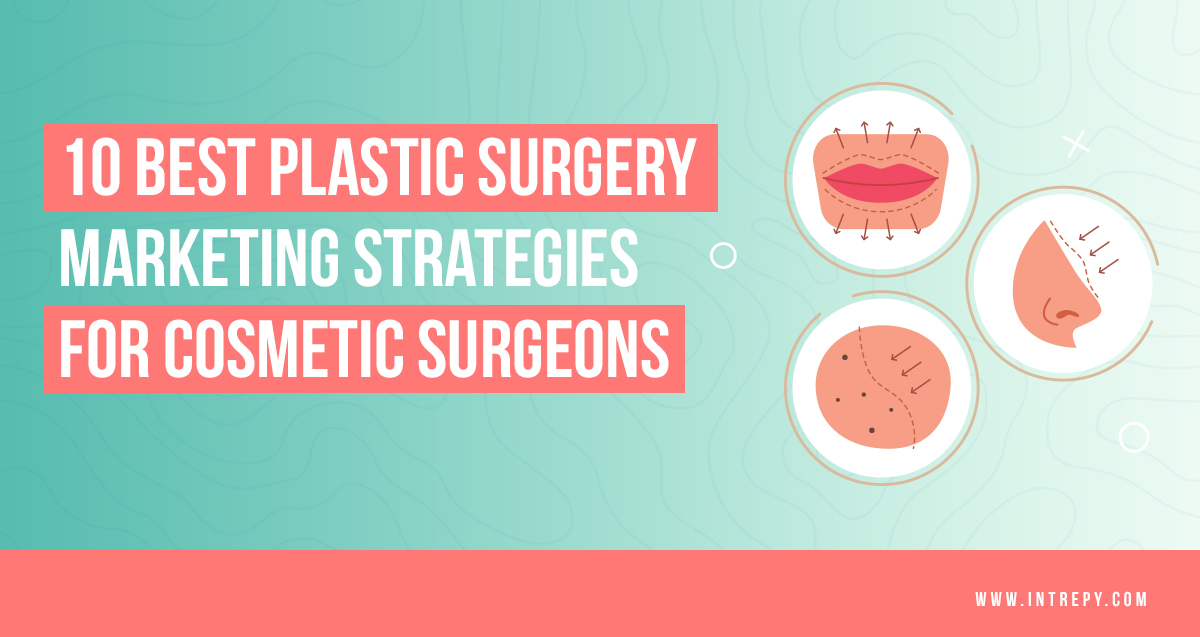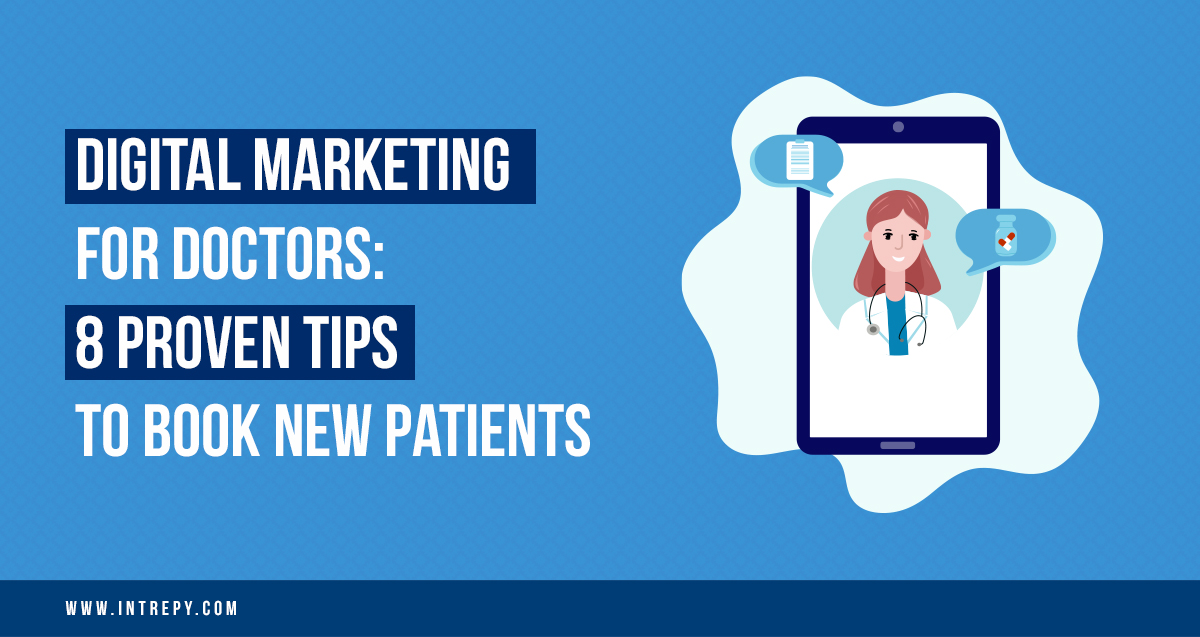In this blog, we will review Google Ads and PPC for Doctors and how to use them to your advantage. Above is a podcast with Nick Laluppa, our head of digital advertising here at Intrepy discussing Google Ads and PPC as well.
- What are Google Ads & PPC?
- Nick talks about how Google Ads function at a higher level.
[09:09 – 32:38] Strategy Development
- Establish your patient personas first
- Think like a patient (what type of keywords will they be searching for?)
- Stay away from Google Smart Campaigns (it’s a great way to lose money)
- The key elements in search ads
- What makes a good landing page?
- Targeting and Retargeting
- Choosing the right budget
[32:39 – 37:27] Potential Problems to be Aware of
- Nick talks about potential problems when marketing medical and health-related services you should know about
[37:28 – 43:31] Tracking Your Campaigns
- The different strategies you can use to track your campaigns
- Call tracking
- Google Tag Manager
- Hire the appropriate professionals
[43:32 – 46:12] Closing Segment
- Check out our previous episodes featuring Nick and ways to connect with him. See the links below.
- Final thoughts and gratitude
- Have a Happy Holiday!
Tweetable Quotes:
“You should stay away from choosing the smart campaigns that google offers.” – Nick LaIuppa
“You want to tell people exactly what it is you offer and how they can get it as soon as possible.” – Nick LaIuppa
Resources Mentioned:
- Google Tag Manager
- Pay-Per-Click (PPC) definition
- Patient Convert Podcast Ep. 126 – w/ Nick LaIuppa
- Patient Convert Podcast Ep. 136 – w/ Nick LaIuppa
Subscribe & Leave a Review
Subscribe to the Patient Convert Podcast and never miss a new episode!
Please support the podcast by leaving a Review
Connect with us on social media:
What We Do
Get a free practice marketing assessment – Intrepy Healthcare Marketing
Check out Kelley’s physician liaison training platform – Physician Liaison University
Check out our Physician & Social Media Video Creation tool – CaptureMD
Interested in being a guest on the podcast? Click Here to apply
Thanks for listening. Justin & Kelley Knott
What is PPC for Doctors?
PPC, or pay-per-click advertising, makes it possible to reach the right people with the right offer with your ads.
The buying process is a bit different due to the many providers in the healthcare field.
As the name suggests, you only pay when someone clicks on your ad, no matter how many people have seen it.
This makes it easier to figure out how ads work, but it also puts more pressure on the marketing team to make sure the right people see the ads and they get the best results possible.
PPC is a good tool for doctors because more and more people are looking for medical advice on the Internet.
A Google study found that 77 percent of people looked up their symptoms on the Internet before making an appointment with their doctor.
When someone sees a paid ad, 28% of people went to the website of the practice advertising, which means pay-per-click can be a big driver to get people to visit your website.
Google Ads for Doctors
Google Ads are the sponsored results that show up at the top of Google Search Results.
When you see the word “Ad” next to a search result, it means that website paid to be there, and any ads within the search platform are considered search-based ads.
At the higher level, Google Ads consists of keyword bidding and it is all algorithm-based when it comes to ads that may pop up for certain keyword searches.
The first one or two search results are shown by defining keywords and targeting them because people who are searching for those keywords are interested in what you have to offer.
Google knows when people search and what they search for.
Typically, these searches are used for research or education purposes for themselves about some sort of medical condition.
When it comes to search platforms like Google and Bing, the intent for the search is established, whereas social media may be more difficult to define intent.
Google Ads are a great place to start so you can establish your target audience and get their attention.
Once you’ve established a plan with your Google Ads, you can leverage Google in many more ways.
Medical practices should also take advantage of Google with the display network.
This includes millions of other websites that Google has a relationship with and will do the work for you and promote your practice on these other websites.
This will help generate new leads and increase your brand awareness.
An example would be when someone searches for a product on Amazon and then visits another website and the product that was previously searched for pops up on the new site they are visiting.
Map ads in Google give you the ability to have your ads pop up when someone searches for a service you offer in their location if it is the same as your practice or nearby. This will show up on a map for them so they can pinpoint your location and put your brand in front of them.
YouTube is a good example of a hybrid social media platform because it uses a search function and has more engaging content than social media. Due to this ability to directly target certain keywords within the platform itself, this is also a great tool to use.
Strategy Development
Before you do anything when it comes to strategy, it is very important to establish patient personas FIRST, because you need to understand who you are advertising to.
When you formulate your initial strategy your first step should be to think like the patient and put yourself in their shoes. What would they search for?
To establish some good keywords in Google you should always go for the most specific keywords first, such as conditional keywords.
These are quick and easy and can typically be somewhat easy initially to rank for.
The more broad your keywords are, the harder it will be to rank for them due to the high amount of searches.
So, instead of something like “Knee pain,” you can target “How to treat an ACL tear”. The more specific you get with your keyword search, the easier it will be to rank higher on Google Search.
To help position your practice in Google, it’s important to start with a narrow focus like a few of your specialties at your practice.
Do your best to stay away from Google smart campaigns.
They offer these to businesses and make it seem like you’re getting leads when in reality, people are searching for your practice or specialties anyways, so your best bet will be to target certain keywords instead monthly.
These smart campaigns are a good example of a “set it and forget it” mindset where Google will do the work for you after you initially set it up with them, but your return on investment will be much greater without it.
What are the Key Elements In Search Ads?
From an assets perspective some of the key elements for search ads include:
- Landing pages, like a home page
- Service pages
- Condition pages
These pages are vital to help set your practice apart from the rest, and they will help you rank higher in Google search results with the more information you provide on your site.
These pages should be designed by a professional in marketing because they know what Google is looking for, and the pages themselves have the duty of getting someone to book an appointment or reach out to your practice.
What Makes a Good Website Page that Converts to More Business?
Most people read a website page in a Z pattern. Their eyes will typically browse left to right then down the middle and over to the corners.
If you want people to see your image and header, you should always put your Call to Action at the top right, so you can tell people what it is you have to offer and how to get it as soon as possible.
You can frame the issue someone may have and use this to convince them you can help them solve their problem. Set yourself up to be the answer. The third section of your page should be the problem and the solution to the issues your patients may have.
You can include why you’re different from the competition and give them a plan such as a step-by-step process like: “Step 1: fill out our symptom questionnaire”, “Step 2: get a free consultation”, and so on.
TESTIMONIALS are your friend. Real-life experiences from some of your patients are going to help prospective patients as well as Google trust your practice. This is important when it comes to new leads and conversions because they sell what you do from an outcome perspective.
Targeting and Retargeting
Retargeting is one of the biggest pieces of the puzzle when it comes to advertising for medical practices. Display ads are cheap and can help you get your ads in front of thousands of people. It’s important to get back in front of those who have visited your website before.
Google knows so much about people from what they search for and what sites they have visited. In marketing, audiences are the ones that have already been doing research and many categories include:
- Hobbies and interests
- Topic-related websites
- Specific placement searches
Budget
When considering your marketing budget, it’s important to choose a budget that can help bring in enough data that makes the marketer happy, and a budget that the practice is comfortable with.
Try not to spend more than $800 per month on Google ads for about 3 months, as this will help give an idea of where to target next.
When it comes to the budget, what you are trying to accomplish as a practice, as well as what area you are in, are going to come into play. If you are in a large city area, it will be more expensive to market there than if you were to be in a smaller location.
As marketers, we need to get enough data to get a good plan in place for the future, which is why 3 months is a good starting point for the budget.
As mentioned above, getting very specific with your keywords to start will help you make a greater impact on Google.
It’s highly important to understand as much as possible about your patients. Once you’ve established this understanding, you can set your ads to be set to certain age groups, certain locations, and certain times to help your practice get seen more.
Potential Problems to be Aware Of
When marketing medical and health-related services it’s important to remember that anything medical is a touchy subject.
For example, with Google, they don’t want to give people information that may harm them.
This means your ads may get disapproved if it seems that what you’re advertising is not beneficial to someone or is a trial instead of an actual solution.
Be aware that you will have issues with disapproval from Google. If anything speculative, experimental, or inappropriate is in your ads, the Google algorithm will disapprove it. There is a way to appeal these, which may take some time, but are worth it once you get your ad approved.
Sometimes, you will need certain licenses or certifications to advertise certain things. You may also need permission from certain people or companies to advertise their products or services that your practice offers.
Tracking Your Campaigns
Tracking is a necessary part of medical practice marketing because it helps you understand what is working and what is not.
Without tracking, you run the risk of spending your money blindly and not knowing if you will get a return on your investment.
Call tracking is a big deal as phone calls are second to website contact when it comes to new patients getting in touch with your practice.
Below are some more tracking options for your marketing campaign:
- You can use Google tag manager to help you track button clicks and more to see where you’re getting the most attention on your website
- Google Analytics can help you track certain marketing goals
- Conversion tracking is important and you need to know what you’re doing; your best bet is to hire a marketing company to do this for you
Instead of plug-ins, use the recommendations above because it is easier to manage than plug-ins themselves. The more plug-ins you have, the more it may slow down your website, which can decrease your conversions.
Wrap-Up for PPC for Doctors
As we have learned in this blog, Google Ads are a big part of your marketing success for your practice.
PPC for doctors comes as a huge benefit when first starting out and offers insights into who your patients are and what they are looking for.
Are you ready to dive into your Google Ads and get your practice towards the top of Google search?
Reach out to us and get a free quote today to help get you started.



